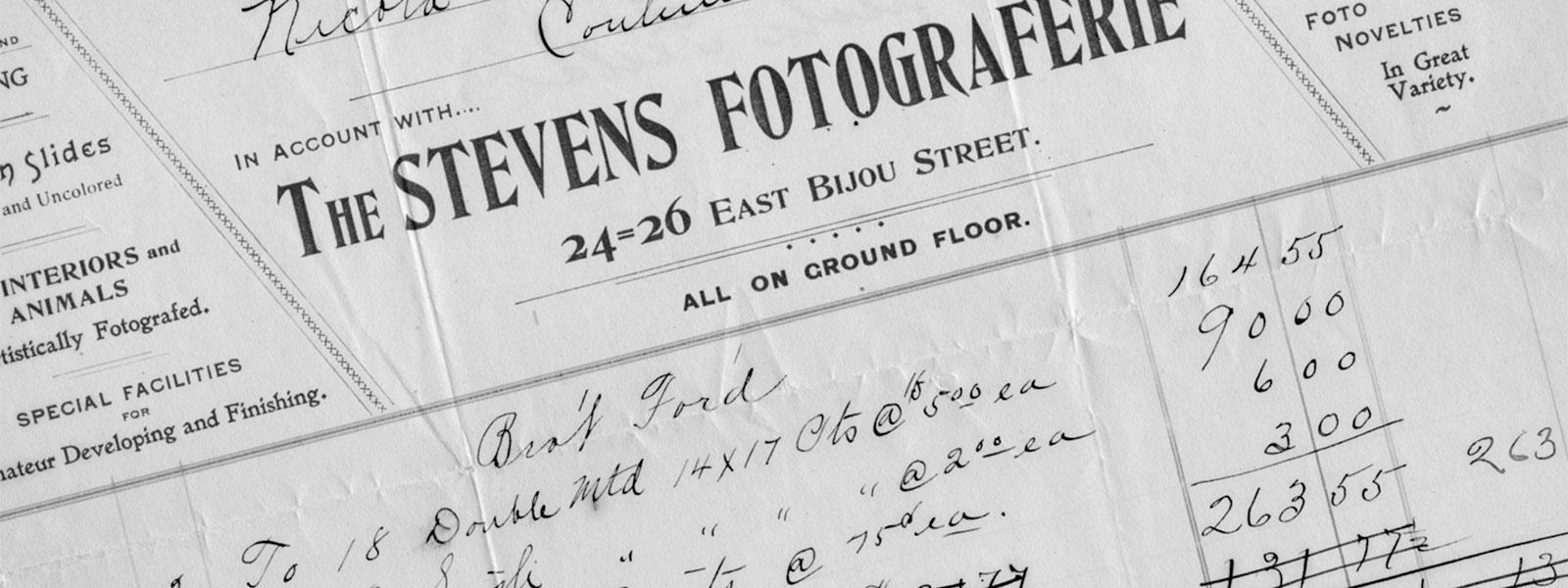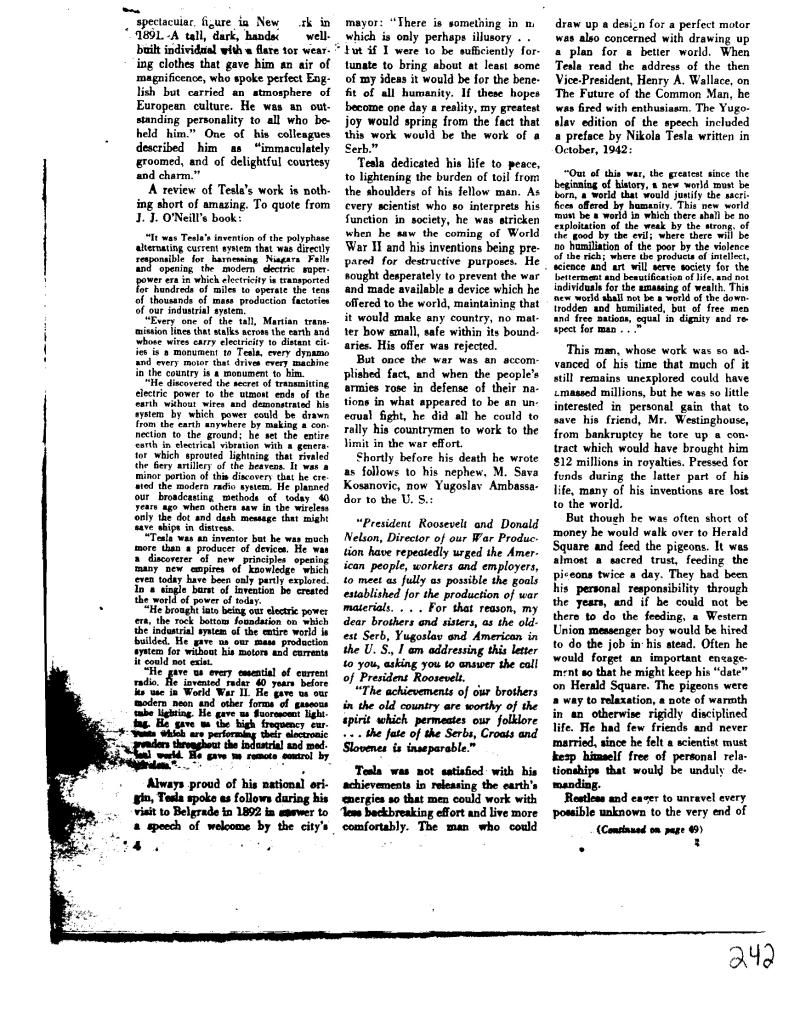
Nikola Tesla Documents
Nikola Tesla FBI Files - Page 242
rk in spectacular, figure in New 1891 A tall, dark, hands well. built individual with a flare tor wear. ing clothes that gave him an air of magnificence, who spoke perfect English but carried an atmosphere of European culture. He was an outstanding personality to all who beheld him." One of his colleagues described him as "immaculately groomed, and of delightful courtesy and charm." A review of Tesla's work is nothing short of amazing. To quote from J. J. O'Neill's book: "It was Tesla's invention of the polyphase alternating current system that was directly responsible for harnessing Niagara Falls and opening the modern electric superpower era in which electricity is transported for hundreds of miles to operate the tens of thousands of mass production factories of our industrial system. "Every one of the tall, Martian transmission lines that stalks across the earth and whose wires carry electricity to distant cities is a monument to Tesls, every dynamo and every motor that drives every machine in the country is a monument to him. "He discovered the secret of transmitting electric power to the utmost ends of the earth without wires and demonstrated his system by which power could be drawn from the earth anywhere by making a con. nection to the ground; he set the entire earth in electrical vibration with a genera. tor which sprouted lightning that rivaled the fiery artillery of the heavens. It was a minor portion of this discovery that he created the modern radio system. He planned our broadcasting methods of today 40 years ago when others saw in the wireless only the dot and dash message that might save ships in distress. "Tesla was an inventor but he was much more than a producer of devices. He was a discoverer of new principles opening many new empires of knowledge which even today have been only partly explored. In a single burst of invention be created the world of power of today. "He brought into being our electric power era, the rock bottom foundation on which the industrial system of the entire world is builded. He gave us our mass production system for without his motors and currents it could not exist. "He gave us every essential of current radio. He invented radar 40 years before its use in World War II. He gave us our modern neon and other forms of gaseous tabe lighting. He gave us fluorescent lighttng. He gave us the high frequency curTents which are performing their electronic onders throughout the industrial and med. Soal world. He gave the remote control by Always proud of his national origin, Tesla spoke as follows during his visit to Belgrade in 1892 in answer to a speech of welcome by the city's 4 mayor: "There is something in m which is only perhaps illusory fut if I were to be sufficiently fortunate to bring about at least some of my ideas it would be for the benefit of all humanity. If these hopes become one day a reality, my greatest joy would spring from the fact that this work would be the work of a Serb." Tesla dedicated his life to peace, to lightening the burden of toil from the shoulders of his fellow man. As every scientist who so interprets his function in society, he was stricken when he saw the coming of World War II and his inventions being prepared for destructive purposes. He Bought desperately to prevent the war and made available a device which he offered to the world, maintaining that it would make any country, no matter how small, safe within its boundaries. His offer was rejected. But once the war was an accomplished fact, and when the people's armies rose in defense of their nations in what appeared to be an unequal fight, he did all he could to rally his countrymen to work to the limit in the war effort. Shortly before his death he wrote as follows to his nephew, M. Sava Kosanovic, now Yugoslav Ambassador to the U. S.: "President Roosevelt and Donald Nelson, Director of our War Production have repeatedly urged the Amer ican people, workers and employers, to meet as fully as possible the goals established for the production of war materials. For that reason, my dear brothers and sisters, as the oldest Serb, Yugoslav and American in the U. S., I am addressing this letter to you, asking you to answer the call of President Roosevelt. "The achievements of our brothers in the old country are worthy of the spirit which permeates our folklore the fate of the Serbs, Croats and Slovenes is inseparable." Tesla was not satisfied with his achievements in releasing the earth's energies so that men could work with less backbreaking effort and live more comfortably. The man who could draw up a design for a perfect motor was also concerned with drawing up a plan for a better world. When Tesla read the address of the then Vice-President, Henry A. Wallace, on The Future of the Common Man, he was fired with enthusiasm. The Yugoslav edition of the speech included a preface by Nikola Tesla written in October, 1942: "Out of this war, the greatest since the beginning of history, a new world must be born, a world that would justify the sacrifices offered by humanity. This new world must be a world in which there shall be no exploitation of the weak by the strong, of the good by the evil; where there will be no humiliation of the poor by the violence of the rich; where the products of intellect, science and art will serve society for the betterment and beautification of life, and not individuals for the amassing of wealth. This new world shall not be a world of the downtrodden and humiliated, but of free men and free nations, equal in dignity and respect for man..." This man, whose work was so advanced of his time that much of it still remains unexplored could have massed millions, but he was so little interested in personal gain that to save his friend, Mr. Westinghouse, from bankruptcy he tore up a contract which would have brought him $12 millions in royalties. Pressed for funds during the latter part of his life, many of his inventions are lost to the world. But though he was often short of money he would walk over to Herald Square and feed the pigeons. It was piceons twice a day. They had been almost a sacred trust, feeding the his personal responsibility through the years, and if he could not be there to do the feeding, a Western Union messenger boy would be hired to do the job in his stead. Often he would forget an important engagement so that he might keep his "date" on Herald Square. The pigeons were a way to relaxation, a note of warmth in an otherwise rigidly disciplined life. He had few friends and never married, since he felt a scientist must kesp himself free of personal relationships that would be unduly de. manding. Restless and eager to unravel every possible unknown to the very end of (Continued on page 49) 242
